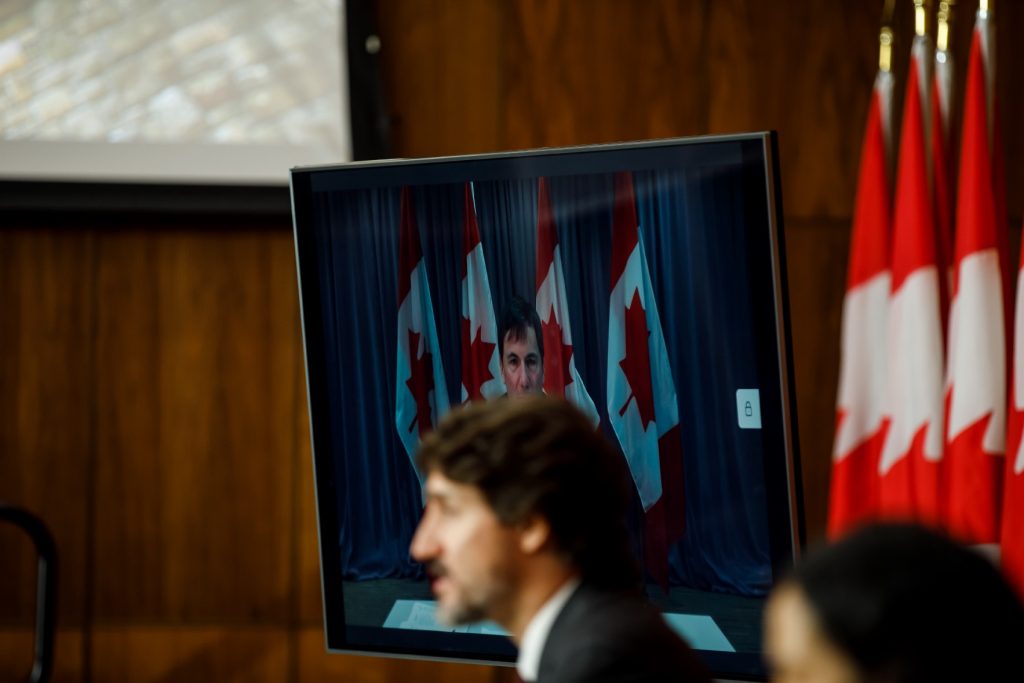Filling the Governor General Vacancy: Opportunity from Crisis

by George Haynal
March 21, 2021
The Julie Payette crisis has given Canada the opportunity to make the office of the Governor General truly our own.
As Payette’s truncated tenure shows — if it was not already clear — the inspirational and constitutional roles of the governor general are not just mutually reinforcing but inseparable.
Many outstanding Canadians who have filled the role with dignity and vision helped to build our country since Vincent Massey, the first Canadian governor general, was named in 1952. His 17 predecessors were British dignitaries on posting here. They all moved home once the job was done.
In fairness, two of those governors general are remembered for donating trophies for amateur sports that became iconic national symbols—Lord Stanley of Preston donated hockey’s Stanley Cup as his tenure was ending in 1893, and Lord Earl Grey gave us Canadian football’s Grey Cup in 1909, two years before the completion of his seven years of viceregal service in 1911.
Lord Stanley was a hockey dad, whose sons all became avid players. Frederick and Lady Constance Stanley faithfully attended their games.
Since the Massey era ended in 1959, when he was succeeded by the beloved Georges P. Vanier, the office has survived in a grey, occasionally controversial zone; neither truly ours, nor any longer truly colonial. We are now nearly 70 years on from Massey’s appointment, in a world as far removed from 1952 as that year was from the Confederation era.
Payette’s resignation in January, on the heels of an independent investigation revealing a toxic workplace at Rideau Hall, has given the Trudeau government a unique opportunity to recognize the fact that Canadians need a different version of a head of state to help inspire us in the challenging 21st century.
Payette’s appointment in 2017 was made with a naivete that would have been impossible had the process been more prudent, transparent and accountable.
Trudeau’s predecessor, Stephen Harper, worried that a more “legitimate” governor general would be politically empowered and tried to make the process more prudent, by creating an ad hoc selection committee that recommended a nominee to the PM. David Johnston, appointed in 2010 following the board screening, was a felicitous choice and served seven years to the day in office, including a two-year extension, until 2017. While Johnson was in office in 2012, Harper formally established the Advisory Committee on Vice-Regal Appointments.
While the nomination process adopted by Harper was and is more prudent, it is neither transparent nor accountable. Neither is the process announced on March 12, with Intergovernmental Affairs Minister Dominic LeBlanc and Interim Clerk of the Privy Council Janice Charette serving as co-chairs.
The prime minister is essentially foregoing the opportunity to create a selection process that is not only prudent but also transparent and accountable. But the opportunity is still there to reinvent the selection process for the future, and thereby make the office itself more apt for turbulent times, and a part of our constitutional system that belongs fully to the Canadian people.
To create this new sort of GG’s role, the prime minister should share the process of selection with Parliament, looking to parliamentarians of both houses to dispose, from among a short list of candidates he proposes. Sharing the responsibility would demand prudence in the selection of the short list, and ensure transparency and accountability through the deliberations of our representatives in the House and Senate. And in a minority House, such as the one we are in now, opposition parties would have a relevant voice in the appointment of a GG who could be in office when the government was defeated on a motion of confidence or supply, especially a budget, and questions arose as to prorogation or dissolution.
Though transparency would be much enhanced, it would still be important to maintain a level of discretion in the process. The initial consideration of candidates could be done by a special joint committee of MPs and senators sitting in closed session, with the final proposal to be submitted by the committee to the House and Senate for consideration and endorsement.
A successful model already exists for proceeding this way. The German president, whose constitutional role is basically identical to that of the GG, is selected through such a process, one that also involves the Lander, the federated states, something that might also be appropriate under our federal constitutional system.
The German experience puts the lie to the argument that such a process would either de-legitimize the process by politicizing the selection or give the appointee additional powers constraining democracy. Paradoxically, choosing our GG this way would help to depoliticize the choice, as a prime minister could not follow his own partisan interests or personal preferences in making the final selection.
Proceeding this way would be far from declaring ourselves a republic, something that would be both deeply divisive and unnecessary. The governor general would still be “the representative of the Crown” in Canada. But this nicety would be moot as the GG would have the legitimacy provided by our democratic system, rather than the tenuous authority provided by the Queen’s signature. All this without creating a constitutional crisis where there is no need for one.
A governor general chosen by the people’s representatives would do much to bind Canadians in a common vision of our nationhood, something that all democracies need badly to cope with the atomizing forces now corroding our social and political life. This could be a part of Trudeau’s legacy as an innovator and democratic reformer.
George Haynal is Senior Fellow at the Munk School of Global Affairs and Public Policy at the University of Toronto He was a career member of the foreign service, who served among other roles as Head of the Policy Planning Staff in Ottawa and Consul General in New York. He has also been Professor of Practice at the Munk School.
